"For citizens and those with coin in their pocket, the grand walls of the city-states a welcoming sight, for there is almost nothing that cannot be found for sale beyond the steel gates. The furnaces burning night and day, the sound of hammer on hot metal, and the rhythmic grinding of stone are the songs the Ashed sing day by day. Take care to stay out of their affairs however, for the sounds of conspiracy and treachery are the songs they sing by night." -Traveler's Guide to Soi
The Ashed City-States or Ashed Confederacy, also known as the smoke stone lands or steel cities by the unclaimed are a loose confederation of nation-states inhabited by the Ashed peoples centered around fortified urbanized areas and manufacturing centers of Soi.
They are politically isolationist and make up a small portion of the population of Soi.
Cities are often given very indicative names to their location or function such as EastGate, the easternmost city, StoneSpring, a city in the mountain built on top of natural springs or NorthCliff, a coastal cliff city on the northern border.

Ashed Confederacy flag
History
Economy
Import
The Ashed city-states are noted for having an unquenchable hunger for raw materials such as lumber and mineral ores. The focus on manufacturing and refining industries has led them to import massive amounts of raw materials.
Due to the harsh industrial conditions of many of the working districts of the city, the Ashed cities often import foreign medicine primarily relating to respiratory problems.
- Though the cities attempt to remain as self-sufficient as possible, they still import large amounts of supplementary materials.
- Due to the relative wealth of the working class, foreign luxury items are a large import to the city-states.
Export
The city-states are best known for the exportation of cut lumber, refined glass, steel, and mass quantities of tools and consumer goods.
Aside from material products, the city-states often export expertise and contractors to fill work contracts all over Soi.
Production
The Ashed are the most prominent manufacturing centers of Soi. The economy of the city-states is made up of various trade guilds each competing for the most successful guild in their niche business. The businesses of the city are prominently ones that take in raw materials and process them into manufactured goods. The businesses vary greatly from city to city due to different locations and natural resources, but their culture and religion often encourages them to sell services rather than depletable natural material from their own land. The guilds often compete greatly over particularly good craftsmen and jealously guard trade secrets and techniques.
Guild Conflicts
Every guild in the Ashed city-states is often dedicated to producing one specific product as high quality as they can, and then producing it in mass quantities. The competition between master craftsmen of different guilds often leads to corporate espionage trying to steal away the other secrets and craftsmen. Loyalty to one's guild is incredibly important to one's social standing nearly as much as their competence at their job.
Political structure
"When you borrow a tool, you return it in better condition than when you found it, the city is a tool like any other, and it must be kept clean and in good repair when you hand control over to someone else." -Anonymous council member

"Once, I attempted to map out the power struggles of this city and all of its conspiracies. I attempted to map out who owed whom favors, the blackmail, bribery, and ambitious climbers. Ten years later I am still here." -Ethics Council journal
The Ashed City-States are a Plutocratic society, each city-state run by their own council of fourteen. The council is made up of twelve high-powered merchants, one random citizen, and an empty seat for the Immortal that created the civilization if it should show itself. The council itself controls the interior workings of the city government, troops, laws, infrastructure, and taxation, which generally takes a flat ten percent from citizens above living wage earnings. The council may out vote the Immortal if they are unanimously against a vote; otherwise, it has veto power. These occurrences are extremely rare as the fourteenth chair is often empty to the point where most Ashed citizens do not believe it is anything more than a rumor. The council themselves are disallowed from spending taxes on anything they themselves own.The twelve most prominent industries of a city dictate the twelve seats of the council, the highest earning before employees are paid bosses sit in the chairs, the thirteenth chair being a citizen picked by lottery.
The council itself is overseen by the Ethics Council, a secretive group that is responsible for the well-being of the citizenry and prevention of monopolies within the states and councils. The ethics council is a small group, drawing from taxation what they need, with an extremely stringent recruitment process. Should an instance of corruption occur, the council will act swiftly and above the law's jurisdiction ranging from simply arresting and charging the offender to ensuring they disappear forever. The council of fourteen can act against them in their own private capacity should they get out of hand. The government controls only ten percent of the wealth of the city-states at any given time, whereas the council privately may control a greater portion by far.
- The city taxes are controlled by the Council of Fourteen.
- The Ethics Council acts as oversight for the government to avoid corruption.
- A single person known only as "the Handler" organizes council meetings and often plays diplomat between councilors. Their secondary purpose is to see to it that the 14th Councilmember is taken care of should they arrive.
Law
"We do not seek vengeance here. When the law is broken we merely seek to repair the damage." -Ashed judge
- Ashed law is carried out in the same simple, efficient manner as their work. Guards patrol the cities and are responsible for the apprehension of lawbreakers and carry nonlethal tools such as nets, padded clubs, and blunt crossbow bolts. As per usual, the guards wear heavy armor. Wearing armor inside of a city is considered rude unless you are a guard or active mercenary.
- Judges in the Ashed court system are quick at their task. The most common form of punishment is either a fine of money, trade goods, or trade hours. Forced labor is given as a form of punishment for breaking the law and the more skilled a laborer the less time is spent repaying their debt to society. Lawbreakers are made to wear signs denoting their crime as they work.
- Capital punishment is extremely rare and carried out painlessly and away from public spectacle by guillotine.
- Violent crime in Ashed city-states is rare as every member of the society receives basic training and is required by law to own weapons and armor, and permitted to carry so long as they are of age.
- The only illegal good to trade in the Ashed cities are live humans with the exception of in NorthGuard city.
Culture
"These ash-born are quiet and tough. I guess that's why they make everything that way; it's all they know." -Journal from unknown traveler
"The city has two faces, the responsible productive side, and the side that would make you swear it was populated by lunatics." -Encircled diplomat
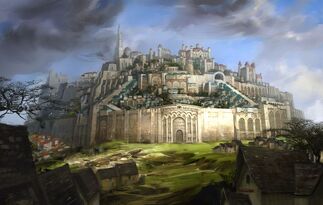
The Ashed peoples mostly live in their stone-walled cities, some of their population living around the city just outside of the walls. As such, they are never far from large population centers. They prize hard work, good craftsmanship, quiet competence, and mental serenity.
The constant competition of companies seeking to get the best employees, the best ideas, and newest innovations leads to constant company espionage and sabotage as well as great production standards. All citizens of a city-state serve in the military from the age of 10 to 18. During these eight years, they are taught the laws, combat doctrine, basic reading, and mathematics. During their last years in the service they typically guard the wall or patrol the streets with older guards to maintain order in the city. Therefore every citizen at some point has served to uphold the laws of their society and, in theory, should have a sense of camaraderie and belonging. During the middle years they are given aptitude tests in a variety of business skills important to the industries of the city to help prepare them for when they leave and become full citizens. This helps them find their purpose in accordance to their philosophy and a stable job. Some Ashed that show aptitude for combat may stay in the guard or are hired by mercenary companies. To defend the city, they are sent all over the world, or train the new generation of recruits.
In the job market, though some positions pay more due to skill level or demand, social worth is determined by the skill and dedication to the individual's job, not the job itself. The idea feeds into the great machine, as every piece is equally important, for without the street sweepers or cleaners, plague may break out, but without the builders, their walls would collapse. As such, nearly every Ashed works diligently and is paid both in respect and good wages of the society, with meaningless shows of excessive wealth being akin to public indecency, which reflects in their architecture, clothing, culture, and crafted goods, which are typically devoid of any decorative aspects.
All Ashed wear thin, leather sashes often made of human hide that bear two marks on the front which denote their current company or guild of employment and their specific trade. The back of the sash is branded with symbols of proficiency showing their acquired skills and abilities. Changing companies or trades is often frowned upon as loyalty to company and skill in one's trade is highly prized.
- The Ashed culture has no nudity taboo. The only real sexual taboo is activity between children and adults
- Being loud without purpose is considered extremely rude.
- It is possible for an outsider to become a citizen of the city-states. The process takes eight years and they go through a similar system to the school and guard program.
- Having children intentionally is referred to as "forging" people and is considered to be a fulfilling job.
- Marriage contracts do not exist in the Ashed. It is instead an agreement between two people to produce and raise a child.
Work Culture
"That feeling of content, that quiet dignity at the end of the day, with coin in your pocket and a drink in your hand, knowing that you made an impact and put in a good day's work, that is true happiness" -Ashed factory worker)
"I've seen steam engines less determined."
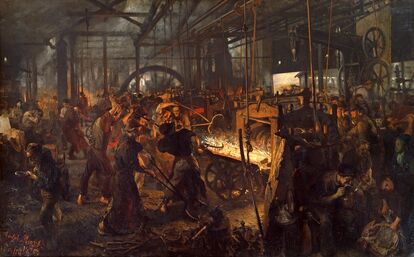
The Ashed revere work and productivity as fulfilling one's purpose in life, and expect to be compensated appropriately for their efforts. Being good or efficient at one's job is a mark of social status, and being happy at one's job is considered the equivalent of spiritual enlightenment. Ashed at age ten begin their six-hour school days which partially consist of training them for the guard and militia as well as teaching them to read and basic arithmetic. The true purpose of the Ashed education program is to take them on field trips to various companies and workshops and having them sample the jobs to find their aptitude so they may be hired by those businesses when they come of age. The work the children put in at various businesses is also considered a public utility as well as an educational program.
While Ashed citizens put in long hours at work, it is equally important to their culture that they receive equally long breaks from said work in order to "quench" and recover. The Ashed wages are set to grow with company income, leading to the largest, most successful companies to pay their workers better, leading to intense competition to work for these top companies. The minimum an Ashed would have to work in order to support themselves is tiny compared to the average work schedule, it is considered shameful to work the minimum amount to support oneself unless one has a very good reason. Most non-Ashed do not have the natural or trained durability to cope with city life.
The average Ashed citizens are well paid for their efforts, The Family Hearth will often cite the profitable nature of bringing consumer goods to Ashed cities. Exotic medicines are often in high demand. Though Ashed are well-paid for their efforts, the combination of stress on their bodies, combined with spending so much time with industrial by-products leads them to have relatively short lives compared with other, more agrarian cultures. This can be mitigated somewhat by the breathing masks and other safety gear they wear while working in the industrial districts.
- Ashed companies must be staffed exclusively by citizens in order to be based in the city-states or suffer strict tax hikes and trade limitations.
- The average adult Ashed citizen works 48-60 hour work weeks in 12-16 hour shifts in often grueling factory conditions. After four solid days of work an Ashed typically gets four days off at a time. Ashed work weeks last eight solar rotations. The bare minimum to support oneself is typically estimated at 20-30 hours over the eight-day work week. This however is considered shameful unless one has a condition that limits them.
- Ashed will find the use for anything and anyone, even someone with no legs and one eye can count the products at the end of an assembly line. Even someone mentally deficient can sweep the streets.
- Workers that are injured are typically taken care of by the company that employs them by finding them another job to do.
- Ashed city-states are filled with "green districts" which are large segments of the city filled with lakes, trees, and other natural life. These are typically reserved for workers on break from work and are located directly next to work districts to lessen commuting time between work and breaks.
- Ashed in manufacturing jobs are typically paid by volume of output. Jobs where effort cannot yield greater output is paid by hours worked.
- The larger Ashed companies occasionally harvest steam dynamo-powered machinery. These however are rare and considered expensive, inefficient toys compared to the amount of Ashed smiths one could hire for the cost of one of these machines.
- Having children is considered to be work and thus a perfect reason to cut one's working hours in half.
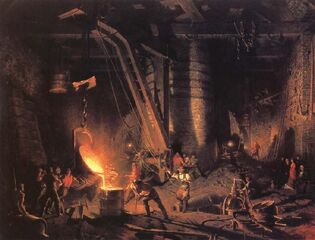
Citizenship
Every native-born Ashed citizen must serve a mandatory period of six years of military service and training, beginning at ten years of age. This military service incorporates basic-level education, including the ability to read and perform basic math and life skills as well as Ashed combat doctrine. For six years, every citizen trains and patrols the walls and streets of the city to keep order, security, and a sense of belonging in the society. After age eighteen, they may choose to stay on the guard, or choose another vocation they have discovered their aptitude in. The most skilled in combat or leadership usually stay in as guard captains, or are hired away by Ashed mercenary companies.
Military
"The ash-born never fight outside of their borders, unless of course you have the coin to pay for it." -Family Hearth caravan master
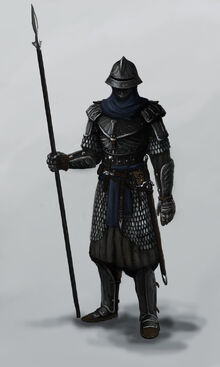
The Ashed military is primarily made up of private mercenary guilds that are based in the cities. Their small
population and lack of global involvement has made it so that their government-controlled forces are limited to its city guard of mostly trainees that are not supposed to leave their borders. In the event the Council of 14 or Ethics wishes to engage in forces outside of their borders, they must draw upon public funds to hire mercenary companies from within their cities.
Due to the resource policies, the steel used by Ashed mercenaries and guards is often coated with human byproduct oil in order to protect it from corrosion. It is stated that you can tell the approach of Ashed mercenary armies by the sound of their armor and the smell of oiled steel. This, combined with their face covering helmets and extreme durability, has led to more superstitious peoples believing that Ashed mercenaries are in fact steel constructs given life.
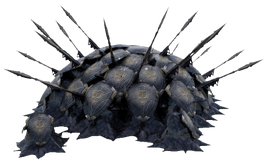
Ashed soldiers are not very numerous in comparison to other civilizations, but as a consequence of being so near their city-state, are never short of of high grade steel. Coupled with their training and natural endurance, even the lightest of Ashed soldiers are classified by many other civilizations as heavy infantry due to the thickness of their armor and shields. They tend to fight in phalanx formations made up of heavy, two-handed shields and spears with pockets of crossbows behind the walls of these human fortresses. Cavalry charges are almost unheard of, but they do occasionally field domesticated war bear/boar cavalry, which tend to be slower than horses and rather short ranged, but devastating if used correctly.
In the event of invasion or danger to the city or its interests, or under direct command from the Immortal, the city may temporarily conscript every citizen of fighting ability and mercenary company until the danger has passed. Each company comes with its own set of combat doctrines and strategies.
World activity
"The Ashed don't get involved in any events outside of their borders, and I'm not sure whether or not to be frustrated or relieved." -Encircled diplomat
"For all of their talk of neutrality, I've seen an awful lot of their warriors and weapons in the world." -Syndicate representative
The Ashed city-states do not get involved with the greater politics of Soi due in part to their economic connections to most of the world, small population, and their inability to unite the cities without the threat of imminent destruction.
Oftentimes agents of individual businesses will be seen operating in the interests of their guild throughout Soi usually in the interest of acquiring resources or skilled individuals, but they never represent the city or confederacy as a whole.
The Ashed maintain neutral relations with most nations, occasionally fighting off Goran or Woag incursions, fighting random barbarians, or border skirmishes with the Tallet Empire, even if they maintain trading agreements with individual cities.
Reaction to other nations
Goran
"The Goran are building a world all their own, and there is no room in it for anyone but themselves. Our mercenary guilds are grateful for this." -Ashed city watch after a Goran siege
The Circle
"They expect the world to be better without realizing the world will want something in exchange."
"The circle builds all manner of clever machinery and inventions when they should be strengthening the skill of their people. While they are undeniable effective they are lost without their tools."
Broken Kingdoms
"One of our best customers, their appetite for steel is insatiable. Their master craftsmen mirror our own guildmaesters. If they didn't care so much for form rather than function their industry would rival our own.
Family Hearth
"Without the Family, our wares could never have traveled far across the world as they have, and without the markets they open to us, our great cities could never have risen. We are thankful to have allies such as them, and strive every day to be worthy."
Tallet Empire
The Steel Cities

City Design
The cities themselves are built in concentric rings of large stone walls. Each wall forms a separate district which divides the functions of the city. This design makes them incredibly easy to defend and fortify as even if a wall is breached, as it only makes a small portion of the city vulnerable. The outer rings of the city are often reserved for industrial districts or lower income housing, having larger pieces of available space in comparison to the inner ring. The inner ring usually houses the government offices, or higher income houses. Each city is usually build near water reservoirs or places where fresh water can be pumped into the city for a variety of functions from sewage and personal use to cooling parts of the city which may be overheated. The color scheme of these cities tends to be very light on the streets and rooftops in order to keep them cool due to the lack of natural wind currents being blocked by the walls. Within the city are green districts to further amplify this cooling effect which also serve as resting spots for weary workers in between shifts.
Outer Districts
- Industrial districts- Large areas of the city built for housing factories and workshops for the production of manufactured goods. Mass production areas are aimed at filling large scale orders.
- Outer market districts- Market areas that sell low- to middle-income goods and services, restaurants, food markets, and local small businesses built for catering to small orders.
- Low/middle-income housing- Large sections of the city built for the lower- and middle-class homes and apartments.
- Outer Green Districts- Large public parks built for relaxation of workers and cooling of the city, often housing artificial lakes and woods.
- Guard District- Barracks and training grounds of the city guard and houses of education are housed here. Judges and small courtrooms are held here.
- Utility District- The areas of the city built to house the pumps and engineers for the cities aqueducts, sewage systems, and stored repair materials.
Inner Districts
- Council Chambers- The simple stone chambers in which the council meets and determines if any government action is needed to fix problems around the city or whether it should be left to the open market. An apartment building exists above each of these council chambers for unknown reasons that remains empty.
- Inner market- Small markets designed to cater to high-cost or high-volume purchases such as massive orders from other nations for manufactured goods or mercenary armies.
- High-income housing- Small districts with few houses and estates which are highly expensive to live in.
- Inner green districts- Smaller public parks that fulfill the same functions as their larger outer district counterparts.
Outskirts
- The outskirts of the city are reserved for farming and housing of farm workers and their families.
Walls
- The outer walls of an Ashed city tend to be anywhere between 10-20 meters tall, 5 meters thick at the top, and 10 at the base built of stone and steel supports. They are dotted with defensive emplacements such ramparts for pouring oil and firing ports for ballistae or catapults
- Sections of the wall are hollow on the inside to accommodate staircases and crank-operated elevators.
- The inner walls match the height of the outer walls, however are much thinner.
- Sections of the inner walls house aqueducts for the cities water supply.
- Gates to the city are built to be easily collapsible in the case of a breach.
Central Tower
- The central watchtower rises high above the city walls and can see every section from its vantage point. The top is part watchtower part communication tower that can send and receive messages via codes of flashing firelight directed with mirrors or beacons.
- The central tower has the schematics of the city's defenses and underground utility systems built into it for easy reference by tower guards.
- "The Handler" lives here.
Undercity
- This is the labyrinth of stone sewer passages and gas pipes underneath every Ashed city in order to harvest the methane gasses coming off of the sewers, and the pipes that carry both clean and dirty water around the city.
- Maps of these areas are only owned by private plumbing or contracting guilds and the city council manager and are considered guarded information.
Resource Usage
"My lover died on the road a few years ago working for one of the mercenary corps. He may be gone, but he keeps me warm even to this day." -Ashed worker on break cheerfully referring to her jacket
The Ashed by culture find a use for nearly everything. The methane gas coming from the sewer systems are harvested for blast furnace fuel, the ashes of cremated bodies are harvested for cement mixtures and bricks to go into city construction, the refuse from any food not eaten is recycled into food for pack animals or fertilizer for the fields. Renewable resources such as crops, wood, and animals are often sold at market; nonrenewable resources such as iron ore are often purchased in bulk from other civilizations so that they may be refined and the finished product may be sold back at a profit. While these businesses may exist in the cities, they often have long standing trade agreements or mergers with other businesses. There are no graveyards in the city-states, as it is considered insulting to waste space after death. Instead human bodies are stripped of useful material. The non-useful material is cremated and the ash mixed with construction materials. This has led some of the more superstitious independent societies to declare the cities haunted.
Forge Gas
Forge gas is the flammable gas that comes out of the sewage systems that carry the human and animal waste from the city to the processing area where it is drained of fluid and turned into fertilizer. The gas is then harnessed to power the forges. The gas burns a bright blue and must be handled with care and the pipe systems that transport it must be kept in good repair or it can cause explosions in the city.
- Forge gas is noted to have a foul smell.
- The use of forge gas allows the city-states to not depend on imported coal.
- The gas is highly unstable and must be managed carefully.
- Occasionally, gas explosions occur in the city due to this system.
Tack
Tack is a food item created in all Ashed cities that does not spoil, and can sustain human beings indefinitely even if it is the only thing one eats. It is made out of insects, dried fruit, nuts, dried vegetables, grains, and other minerals and vitamin extracts. The mixture is powdered, compressed, and sealed with an edible glue to preserve the mixture. The city government stockpiles Tack in case of sieges by Goran forces where the city is cut off from supplies.
- Every Ashed citizen has the right to take a tack ration from the city vaults once per day.
- The amount of tack the citizen is allowed is based on their weight.
- Most choose to eat anything else other than tack.
- Vermin and insects are known to avoid eating tack.
- The taste is described as gritty and bland.
Ashed Concrete
The city walls are made of a combination of steel rods and a concrete mixture made with crushed stone, lime, and the ash from cremated remains of humans and animals that cannot be otherwise repurposed.
- The concrete is mixed with ground stone and, in the case of coastal cities, seashells.
- Structures made of Ashed concrete tend to be very flexible and sturdy, once solidifying appearing to be a single contiguous smooth formation of stone.
- These structures are noted to being incredibly strong but often devoid of any creative design or flair as is the case of most things made by the ash-born.
Carvers
While every civilization has their own burial rites and morticians, the Ashed believe it to be a grave insult to the dead to waste their remains or have them take up space in graveyards. Carvers are recycle workers that deal specifically with the contents of the human body. Carvers are much like everything else in the cities, private guilds which pay the families of the deceased for bodies, then sell the products. Carver guilds have been known to charge high prices to craft specialty items out of the parts of the deceased so that they may be useful long after they are dead, which to the Ashed is a high honor.
- Calcium from the bone is used to make lime in cement mixes, which is used in city buildings.
- Carbon from the bone is used to enrich iron in steel smelteries.
- The skin is tanned to make fine leather products such as sheaths, boot laces, and identity sashes.
- Brain fluid is used to tan the leather.
- The meat is fed to the giant domesticated boars of the city.
- The fat is used to make soaps and wax.
- The unusable pieces of the body are used as fertilizer for the city crops.
- Most other civilizations are horrified by this prospect.